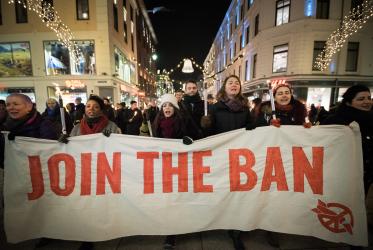The visit to took place 40 years after Marshallese activist Darlene Keju’s electrifying speech to the WCC 6th Assembly in Vancouver in 1983. Preceding that assembly, a team from the WCC visited the Marshall Islands and spoke with affected communities, focusing on the legacy of US nuclear testing.
While nuclear weapons have not been used as weapons of war since the bombing of Hiroshima and Nagasaki in 1945, extensive testing of nuclear weapons in the Pacific region was conducted by the United States, the United Kingdom and France until 1996.
The consequences of this testing have largely remained invisible and unaddressed, whilst victims continue to suffer from the impacts on their health and that of their descendants, the degradation of their environment, and pollution of their waters. Very few people have received compensation or adequate assistance for the consequences they have suffered.
The delegation met with survivors of nuclear testing and their leaders, church partners, and activists including students to hear of their experiences and concerns. The delegation also met with the Marshall Islands National Nuclear Commission. .
The head of the WCC delegation was Rev. Dr. Karen Georgia A. Thompson, general minster and president of the United Church of Christ.
“The visit to the Marshall Islands as a part of the WCC delegation was informative, heartbreaking, and a reminder of the extensive challenges of the nuclear legacy presented to the Marshallese people following the nuclear testing by the United States,” said Thompson. “The WCC and some of its member churches have accompanied the Marshallese churches and people as they sought compensation and nuclear justice in the aftermath."
In meetings with survivors, community leaders, and healthcare professionals, the WCC delegation found that there are extenuating needs in the Marshall Islands. “Food security is a major issue as is the health of those whose lives were impacted by testing and resulting fallout,” said Thompson. “The contamination of the soil and water is detrimental and requires attention as it diminishes the options for sustainability for the people, with food needs being met by processed food sources.”
The Pilgrimage of Justice, Reconciliation, and Unity offers an opportunity for the WCC and member churches to be stronger advocates for the residents of the Marshall Islands, Thompson noted. “As people of faith, we are called to pilgrimage with these siblings in the Marshall Islands as they raise awareness and provide leadership in advocating for change,” she said. “We must bring our voices to the many issues present in these waters of the Pacific.”
Denouncing nuclear weapons
The pilgrimage visit was crucial for the continued accompaniment and advocacy of the WCC on nuclear disarmament issues, said Jennifer Philpot-Nissen, programme executive for Human Rights and Disarmament for the World Council of Churches Commission of the Churches on International Affairs.
“The WCC has denounced nuclear weapons from the beginning of the nuclear age and has continued to speak out against nuclear weapons through advocacy on the Treaty on the Prohibition of Nuclear Weapons both on the grassroots as well as the international level,” she said. “The visit also built on the passage of a resolution at the UN Human Rights Council in 2022 concerning the nuclear legacy in the Marshall Islands.”
Philpot-Nissen added: “The raw grief of the Marshallese communities who have suffered devastating impacts in terms of loss of land, culture, and human lives was palpable throughout the WCC visit. And yet, the team also experienced the courage and brilliance of the Marshallese people who have supported one another and moved together in faith and hope even in moments when they felt most neglected by the outside world.”
Learn more about the WCC work on arms control and disarmament







